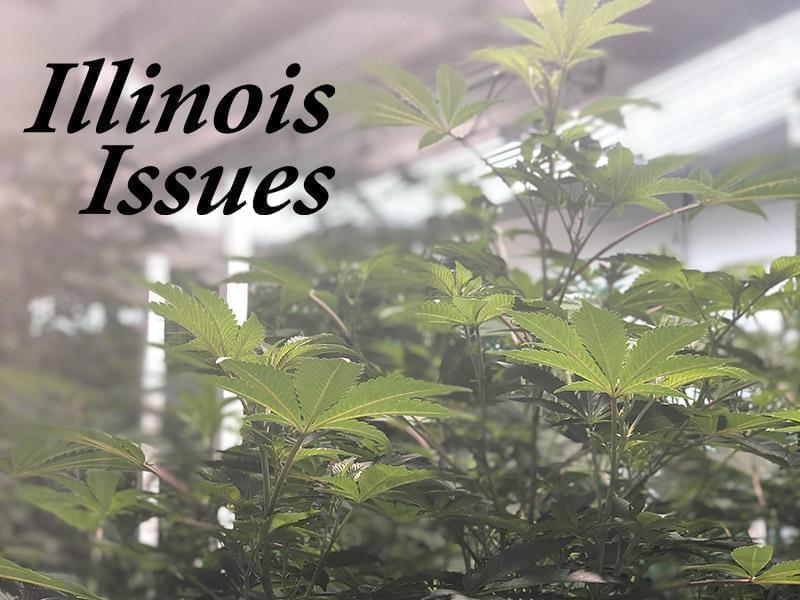Jaclyn Driscoll/NPR Illinois
As political negotiations on recreational marijuana continue, one prominent group, has not yet taken a stance: the Legislative Black Caucus. These are the African-American lawmakers in the Illinois House and Senate.
They are involved in the talks, though, according to state Rep. Jehan Gordon-Booth, a Peoria Democrat and leader in the caucus.
“Any adult-use bill has to have specific consideration as it relates to restoring some of the harm that was done during the war on drugs to communities of color,” she said. “There should be ownership of people of color in this space.”
Gordon-Booth recognized that people will likely make millions of dollars off a drug that disproportionately harmed minority communities for decades, and she wants to ensure there’s equity in a recreational program.
“We don’t want an adult-use program to look like the medical program which essentially is completely and wholly owned by rich people and none of them are people of color,” Gordon-Booth said.
Illinois approved its medical marijuana pilot program back in 2013, and politicians tout it as one of the best, a model for the rest of the country. But it’s also a secretive one.
Chris Stone is the CEO of HCI Alternatives, a medical marijuana dispensary in Springfield and the Metro East. He did not remember all of the specifics of the application process, but he did say it was quite extensive.
According to documents from the Illinois Department of Financial and Professional Regulation (IDFPR), there were five required categories on the application for medical dispensaries. The categories included: suitability of the proposed dispensary, a business and operation plan, a security plan, record keeping and inventory plan, and financial disclosures.
“Each one of our applications was about 1,800 pages,” said Stone. “We had to provide, I believe, six or seven copies of that, but we also had to double the number of copies because we had to provide a clean copy and a redacted copy.”
IDFPR is in charge of the dispensary side of things. The Illinois Department of Agriculture (IDOA) is in charge of cultivation sites. Both departments say neither the full application or the redacted copies are available to the public. Stone mentioned he believed one of the reasons why he was required to redact copies was for Freedom of Information Act requests. But, NPR Illinois’ request was denied.
Stone said names and personal financial information had to be redacted, but wasn’t sure of the other elements.
“When they were reviewing applications they didn’t have the names of anybody in there to affect their judgement when scoring,” Stone said. “They would look at the redacted copy in terms of the scoring, but they had a clean copy to go with it.”
When Stone says “they” he means the people who essentially decided who got a license for a dispensary or a cultivation site. Sources say there were four people for the IDOA and four people for the IDFPR reviewing and scoring applications. But, who “they” are, again, is confidential according to both departments.
There are currently 55 dispensaries and 20 cultivation sites. There’s also no public state data keeping track of who is profiting from them.
For the proposed recreational program, it’s unclear at this time how many more licenses the state will approve. There are competing studies examining the demand for the product. Lawmakers say they want to be sure they are not “over saturating” the market with product, but they also don’t want to underproduce for patients who need it for medical reasons.
Former state senator Pam Althoff speaking on the senate floor.
Pam Althoff, a former state legislator now with the Medical Cannabis Alliance of Illinois, said there’s no need to approve any new licenses in the first couple years because
there’s already cultivation space not being used now.
“When they submitted to the state of Illinois, they had to submit what they ultimately were going to build out,” Althoff said. “But obviously the demand in the medical program was not as great as anticipated because we ran into some difficulties getting the program up and running appropriately so they’re not utilizing their entire square footage that was approved by the state of Illinois.”
State Rep. Kelly Cassidy (D-Chicago) argues this isn’t the case, and there will need to be more licenses approved to keep up with demand. But she gave no indication as to how many the state is considering approving.
Still, many say they want a recreational marijuana program to be more transparent and open.
Sunshine Clemons, the founder of the Black Lives Matter group in Springfield, is one of them. She spoke on a personal level because BLM has not yet taken a stance either.
“You have to provide the steps to make things right for the communities you’ve hurt for all those years,” she said. “I believe that we can take the steps to do it where it can provide equity for the black and brown community that can be legislated. If we can do it that way, then I’m in support of it.”
Still, from a monetary standpoint, there could be a significant barrier. Gov. J.B. Pritzker has already estimated millions of dollars in next year’s budget from legalizing cannabis. That’s only counting the fees to get a license, which he’s suggesting will go for $100,000 each. That’s not counting the application fees and other expenses. For example, it cost $5,000 just to be able to hand in an application for the medical program.
In a statement, a spokesperson for Pritzker said: “The governor believes minority entrepreneurs must have the opportunity to succeed in a new adult-use cannabis industry and is exploring all options to ensure justice and equity are core elements of legalization. Stakeholders are currently negotiating the final bill language to uphold those principles, and we expect the legislation to be filed soon.”
The lead sponsors of the recreational marijuana legislation also say equity in the market is a top priority. State Rep. Kelly Cassidy (D-Chicago) said this is an issue across the country that she hopes to find a solution for.
“First of all, doing the research,” she said. “Getting the lay of the land to see that across the country this industry is only about 4% minority owned. Getting a sense of what states have tried to do to fix for that and where those things have fallen short.”
As of now, details of how they’ll ensure this happens remain behind closed doors.

 Federal trumps states. What they should be doing is investing their time in federal legalization.
Federal trumps states. What they should be doing is investing their time in federal legalization.


